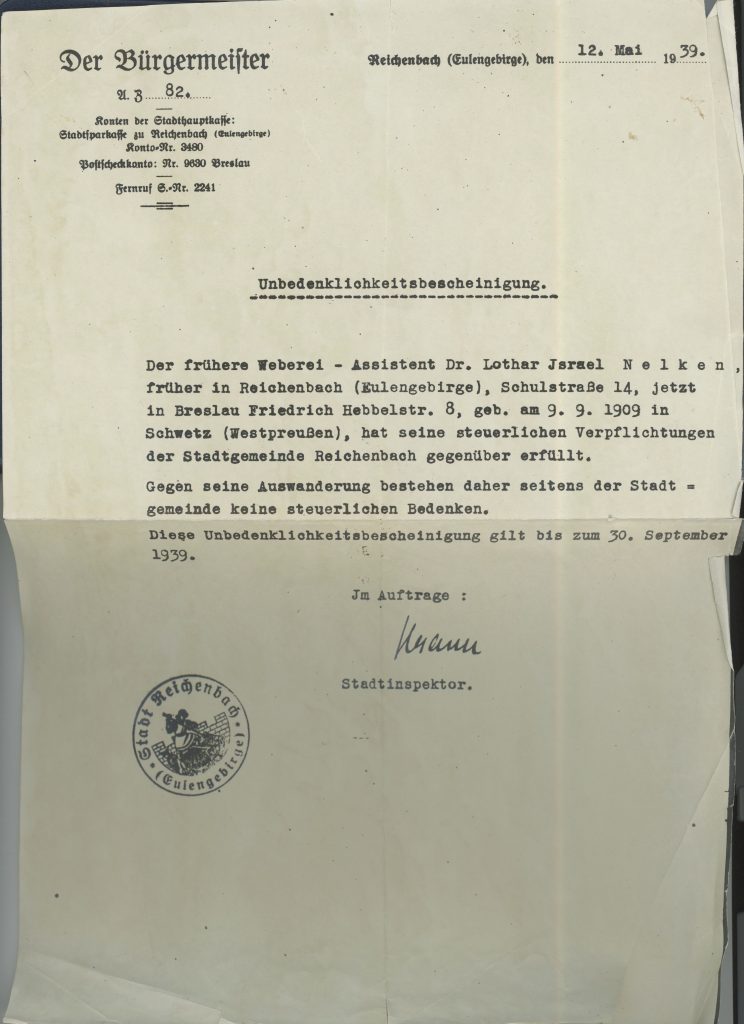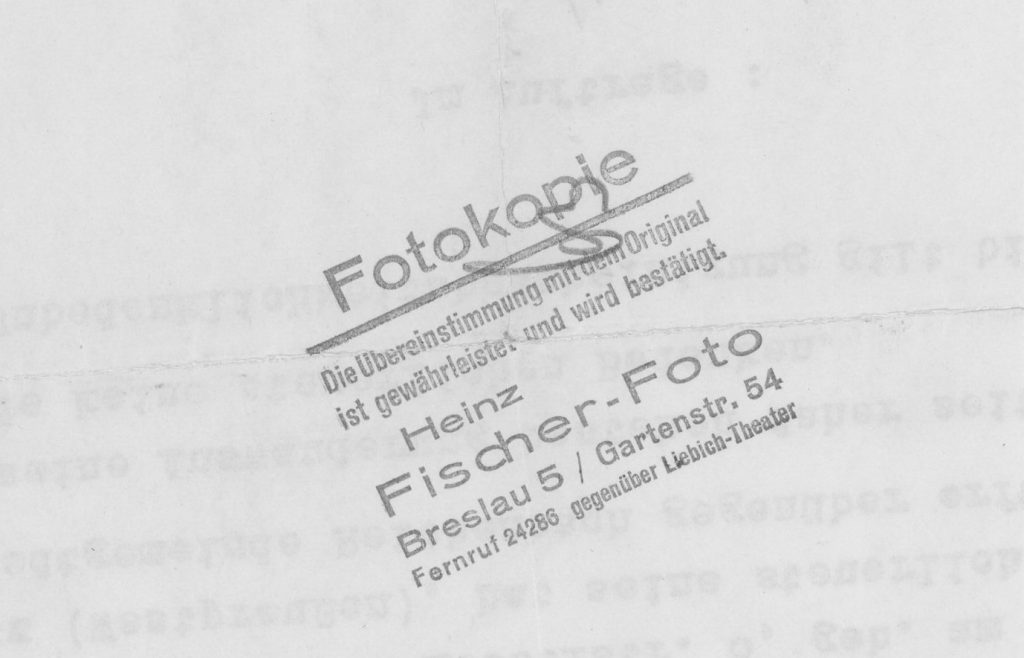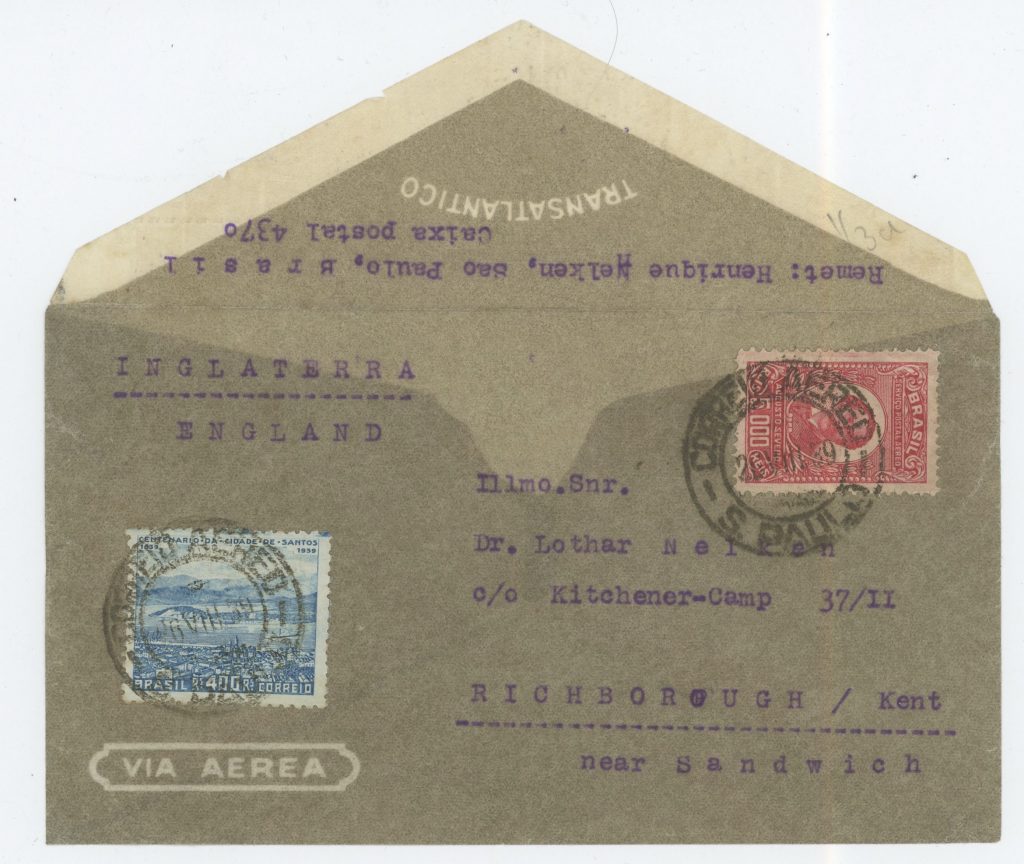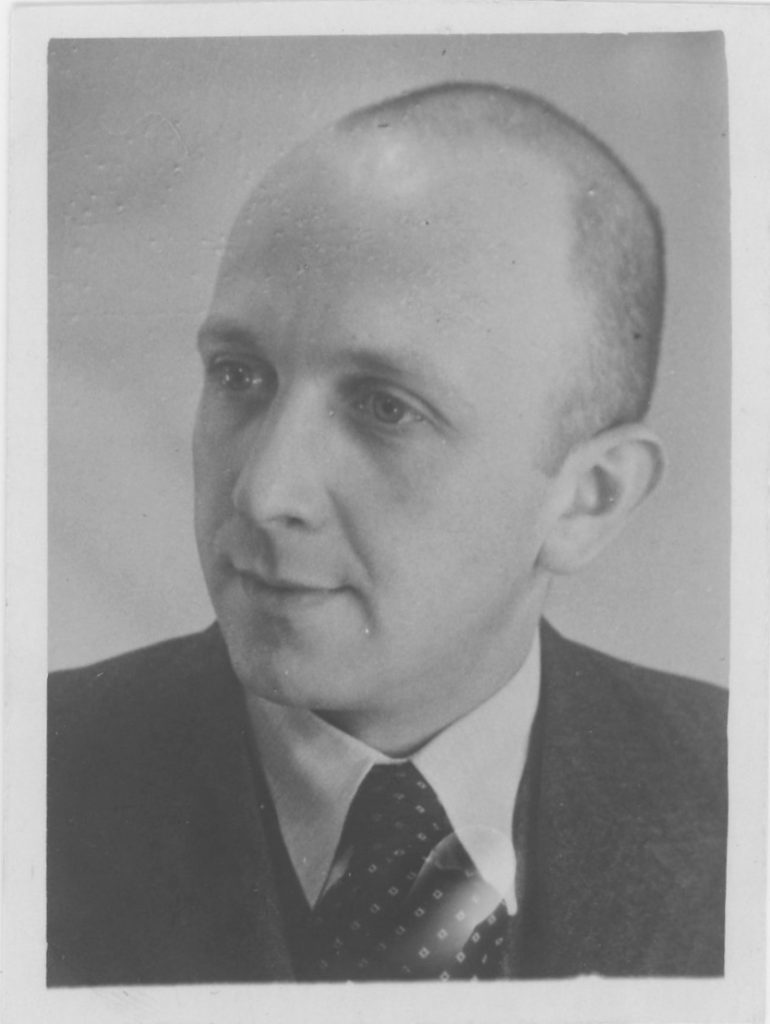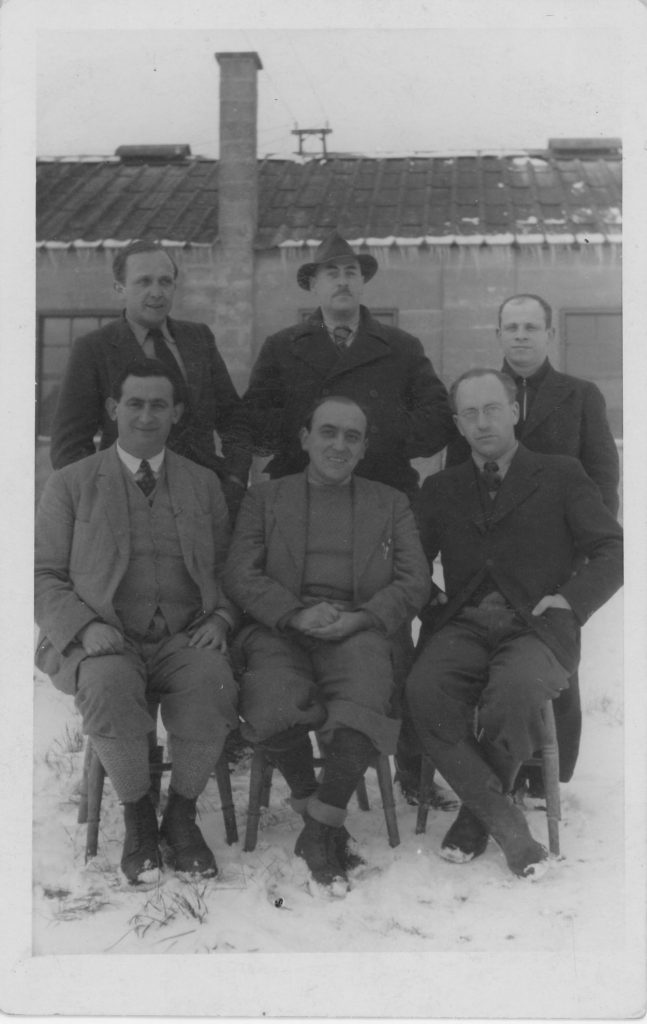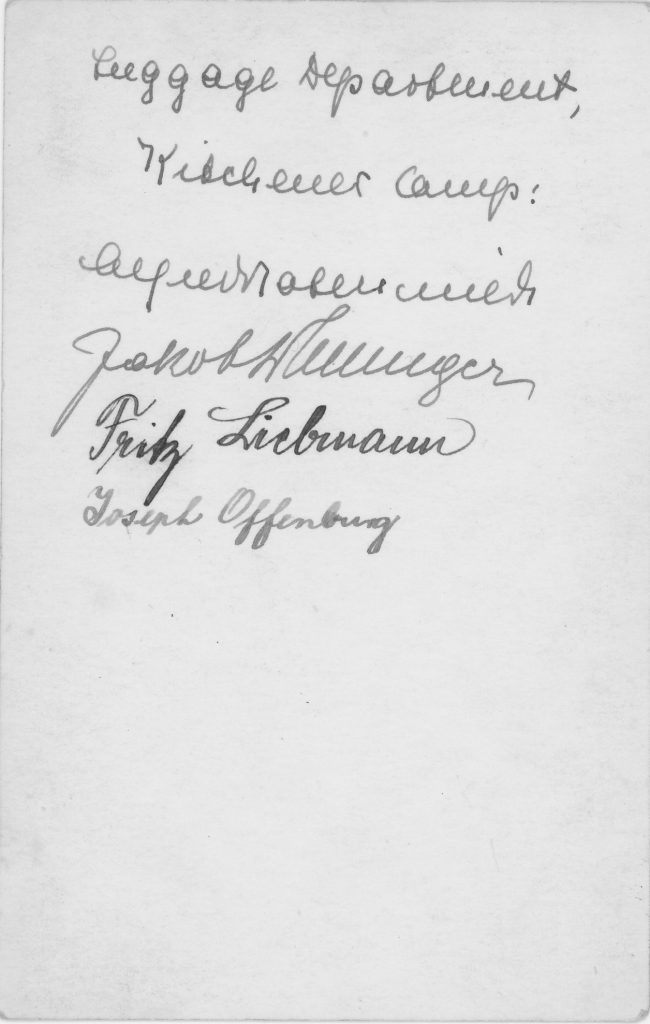Born: Schwetz, West Prussia (now Świecie, Poland), 9 September 1909
Profession in country of origin: Lawyer
Arrived in Britain as a refugee from Germany on 13 July 1939
Documents
[Hand-written additions] Release authorised Category 3
Released 10.09.1940
Interned circular 21.06.1940
Male enemy alien - Exemption from internment - Refugee
Surname: Nelken
Forename: Lothar
Alias: -
Date and place of birth: 09/09/1909 in Schwetz (Westpr.)
Nationality: German
Police Regn. Cert. No.: 712 109
Home Office ref: C 2666
[hand-written addition] N6120
Address: Kitchener camp, Richborough, Sandwich, Kent
Normal occupation: Lawyer
Present occupation:
Name and address of employer: -
Decision of tribunal: Exempted "C" & 9a
Date 16.10.1939
Whether exempted from Article 6(A): Yes
Whether desires to be repatriated: No
Report of Internment
Police: MPD "S" Division
Name of Alien: Nelken, Lothar
Nationality: -
Date of birth: 09.09.1909
HO Number:
Interned on: -
Handed to: -
Reason for internment: Circular 21.06.1940
[Hand-written addition]
Release authorised Category 3
Released 10.09.1940
712109
Source: National Archives, Home Office: Aliens Department: Internees Index, 1939-1947.
Editor’s note: We are not allowed to reproduce National Archives (UK) images, but we are permitted to reproduce the material from them, as shown above.
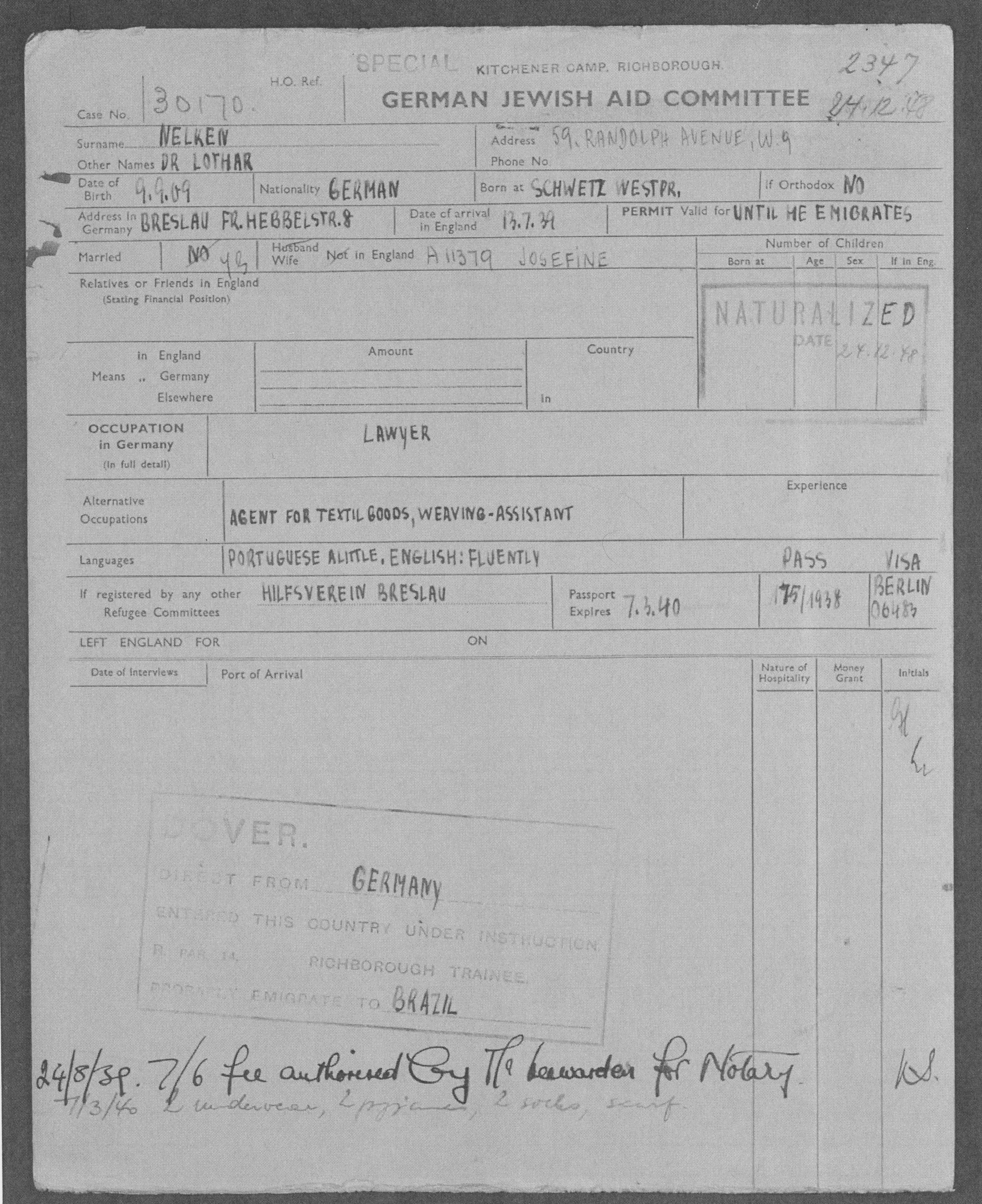
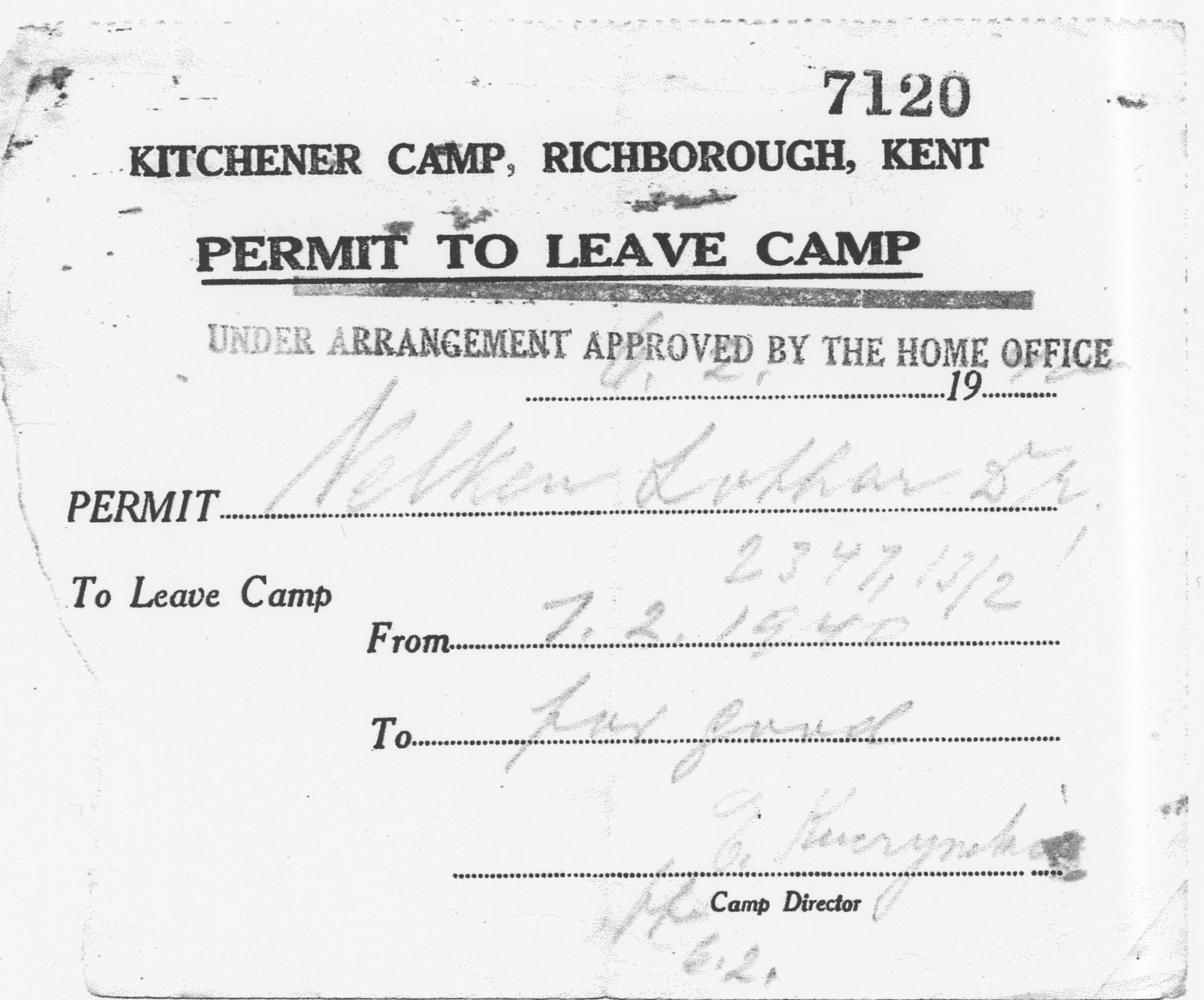
Documents submitted by Stephen Nelken for his father Lothar Nelken, who was at Kitchener camp from 13 July 1939 to 7 February 1940.
Letters
Letters submitted by Stephen Nelken for his father Lothar Nelken
Memories
My father was born in a small town in Upper Silesia in Germany called Schwetz on 9 September 1909.His father had a menswear shop and my father, his parents and younger brother lived in the flat above the shop. There were very few Jews living in the town.
After the First World War that part of Germany became part of Poland and they as German citizens were given the opportunity of going back to live in Germany, which they did, moving to a small town called Neusalz an der Oder.
On leaving school, my father went to university and studied law at both Breslau and Heidelberg where, after completing his Doctorate in Law, he became a Judge in the Landsgericht, which would appear to be something like the County Court in this country.
When the Nuremberg Laws came into being in Germany in 1935, Jews were stripped of their positions in numerous fields and therefore he could not continue as a Judge.
Thankfully, he was very numerate and therefore was able to easily obtain employment as a bookkeeper in various companies.
His younger brother left Germany in 1937 to go to Brazil.
The intention was that he and his mother (his father had died a number of years before) would follow him.
His brother was able to get a further visa in 1939 for my father or grandmother to join him, but my father decided that his mother should take that visa and go to Brazil to join her son there and hopefully my father would join them later.
His mother therefore went to Brazil in 1939.
Unfortunately, the Brazilian authorities then closed their borders to immigration from Germany and notwithstanding various pleas made by his brother and mother to the Brazilian authorities, they were unable to secure a further visa for him.
After Kristallnacht in November 1938 he like many other Jews was rounded up. He was taken to Buchenwald concentration camp with a mass transport of 811 male persons from Breslau (now Wrocław in Poland) on 12th November 1938 and was registered with prisoner number 28038. He was placed in the “Special Pogrom Camp” on the west side of the roll call ground, a place where the SS terror reached its most extreme form. Fortunately he survived and was released on 5th January 1939.
In Buchenwald he experienced seeing prisoners being shot and also hanged, and he suffered various indignities such as having his head shaven and being forced to use pages of the Old Testament and other Jewish books as toilet paper.
An uncle of his was able to obtain a visa for him to go to Chile, which enabled him to leave Buchenwald concentration camp.
However, he decided that he did not wish to go to Chile as he was still hankering to go to Brazil. He had been learning Portuguese in Germany in preparation for a new life in Brazil.
However, it soon became clear that there would be no chance of him getting a visa to Brazil and luckily he was able to obtain a visa to England and came to England, to Kitchener camp, approximately six weeks before the war started, in July 1939. He remained in Kitchener camp until leaving for London in February 1940, where he initially lived in a hostel in Queens Gate.
He then went to live in lodgings in Swiss Cottage and was able to find employment by meeting up again in London with friends of his from Germany who had left much earlier. One was a student friend of his who had started a pharmaceutical business in London (Medo Chemicals) and he joined the company as an agent and worked for them for his entire working life in this country as he was unable to afford to study law again here.
He was interned as an enemy alien for a number of months at a number of race courses throughout England.
When he returned to London, he still lived in Swiss Cottage and his contribution to the War effort was helping to make ammunition boxes and later on as a fire fighter with his little pump in Swiss Cottage.
There was quite a large community of refugees of German/Austrian extraction in the Swiss Cottage area – hence the Belsize Square Synagogue – which resulted in many of the refugees being able to re-establish an excellent social circle in the area.
He married his first wife Josephine Horn in 1942. She died in 1952.
Lothar married my mother, Margarete Haas, a refugee from Vienna in April 1953. They had two children: myself, Stephen, born in 1957 and my sister, Caroline, born in 1958. Unfortunately, my sister Caroline passed away in 1991.
My father passed away aged 75 in December 1984 and my mother aged 90 in September 2003.
Stephen Nelken
Lothar Nelken’s diary
To view the following images, please click to open in enlarged full form
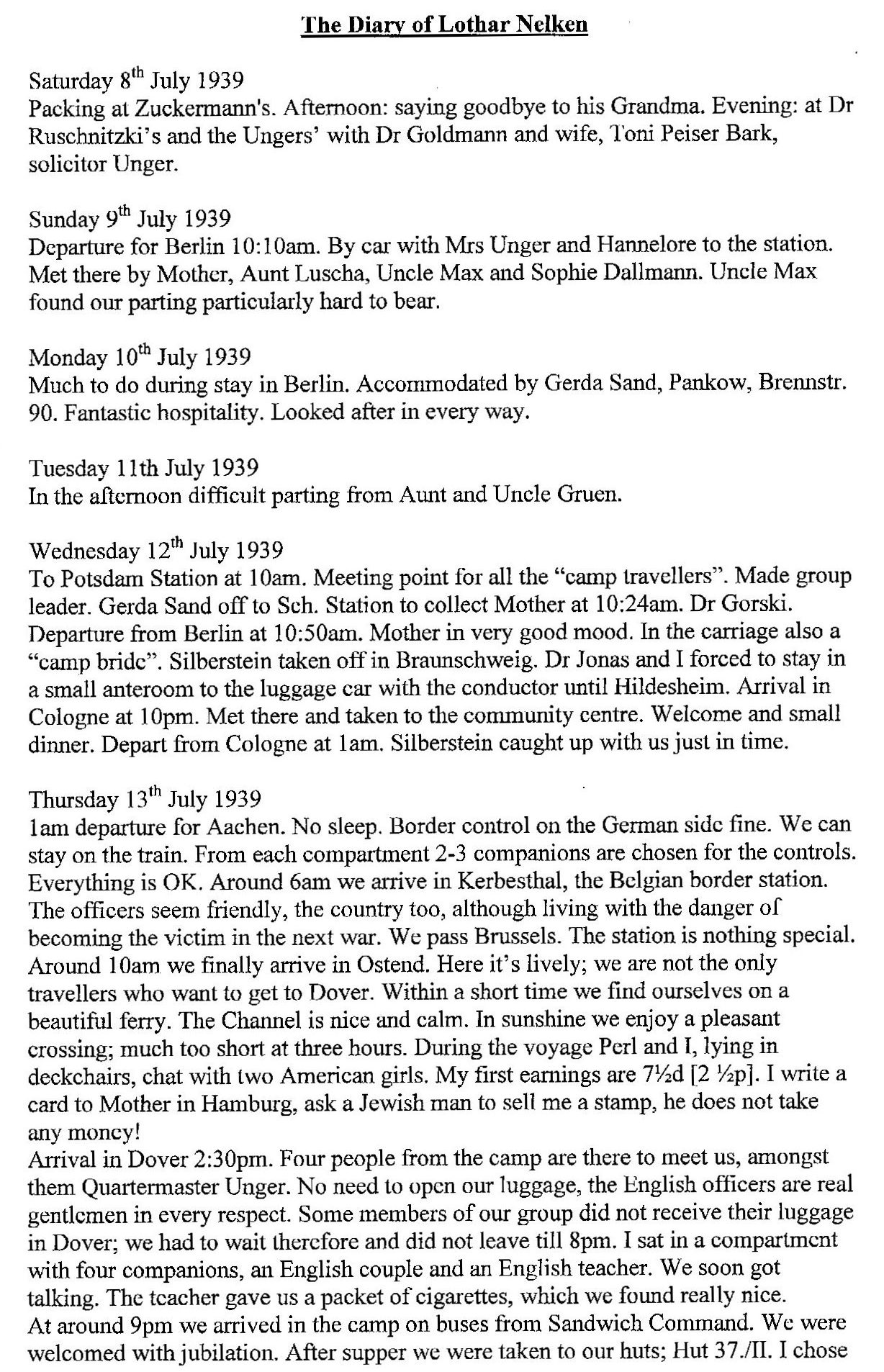
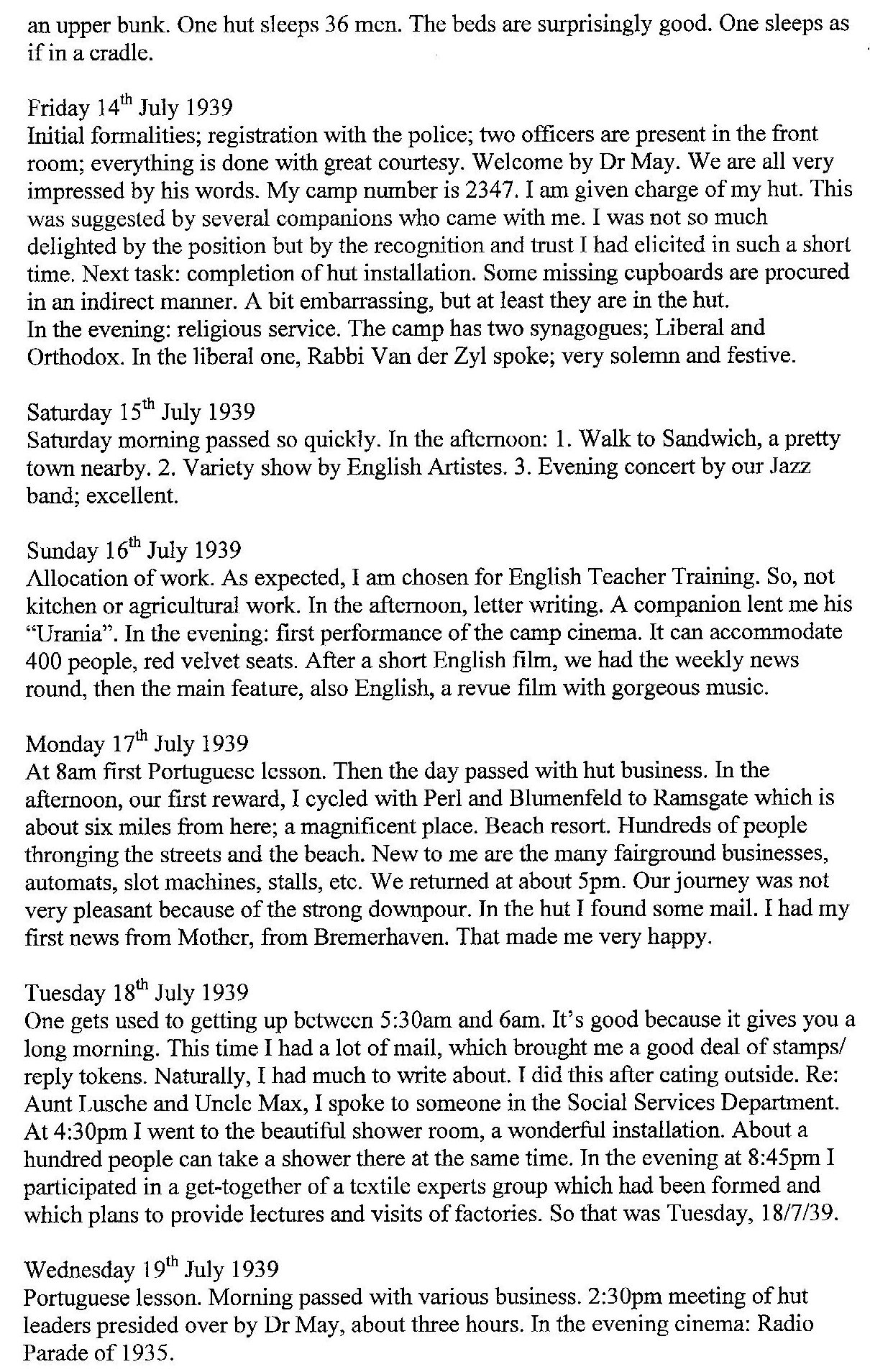
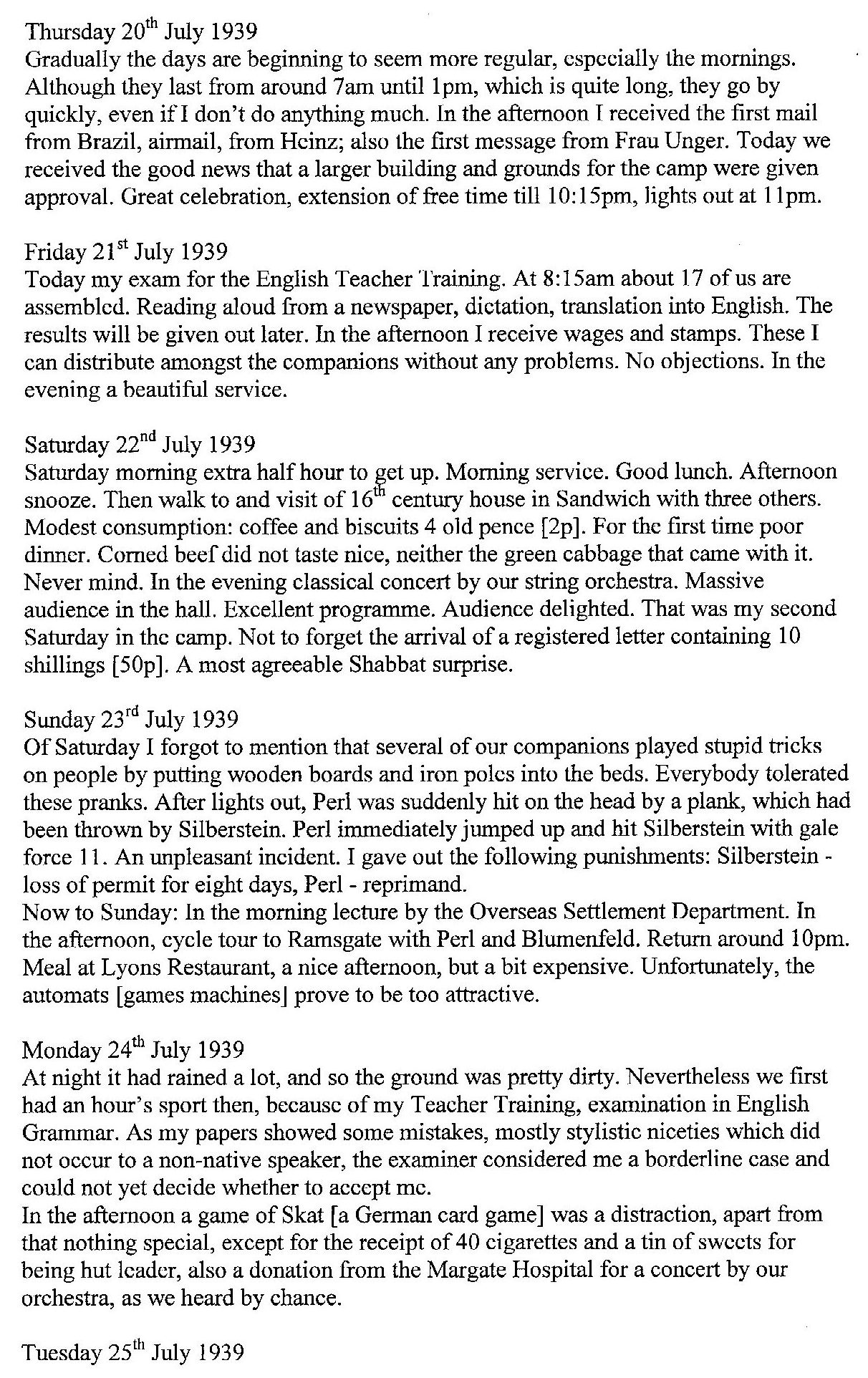
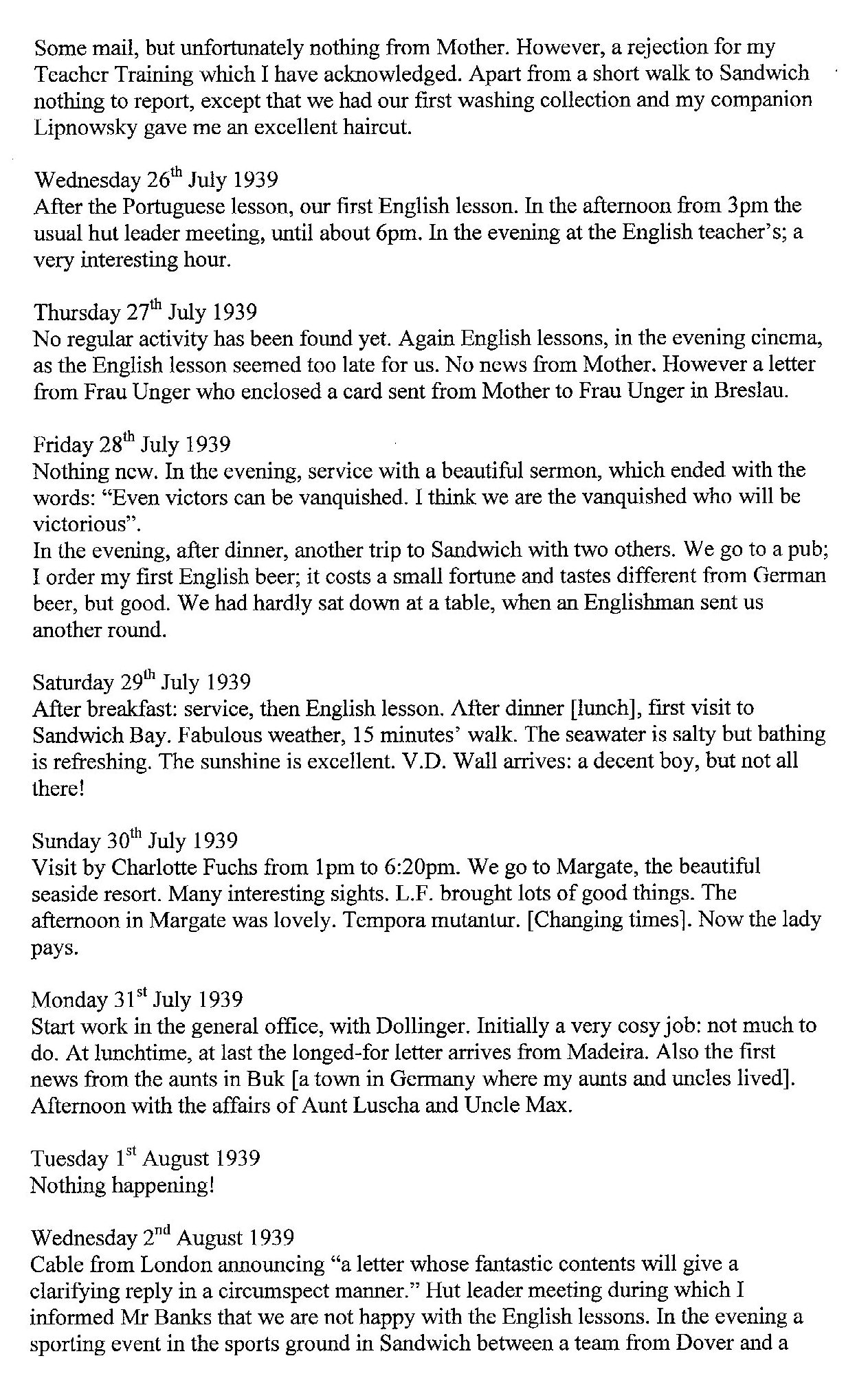
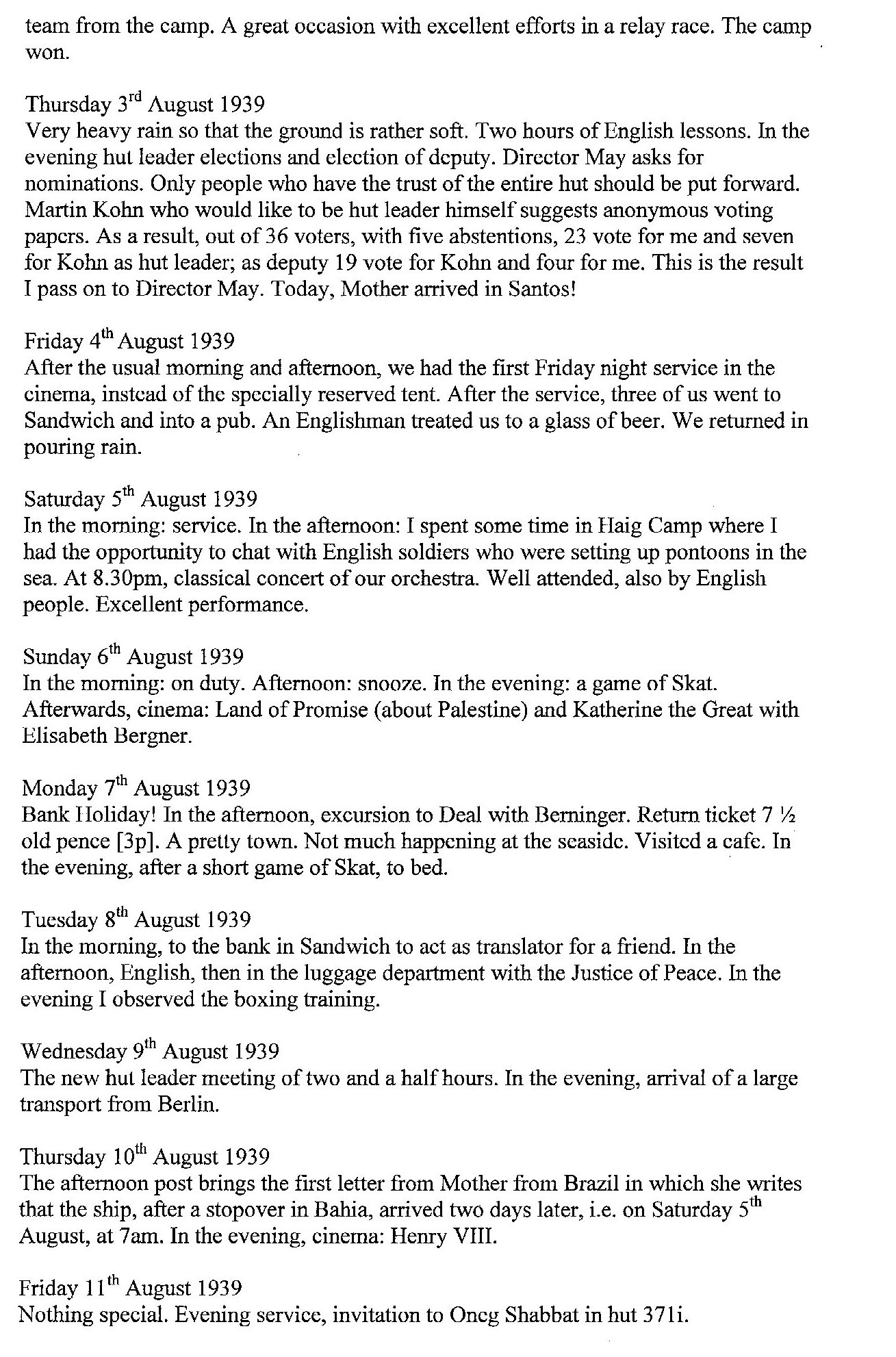
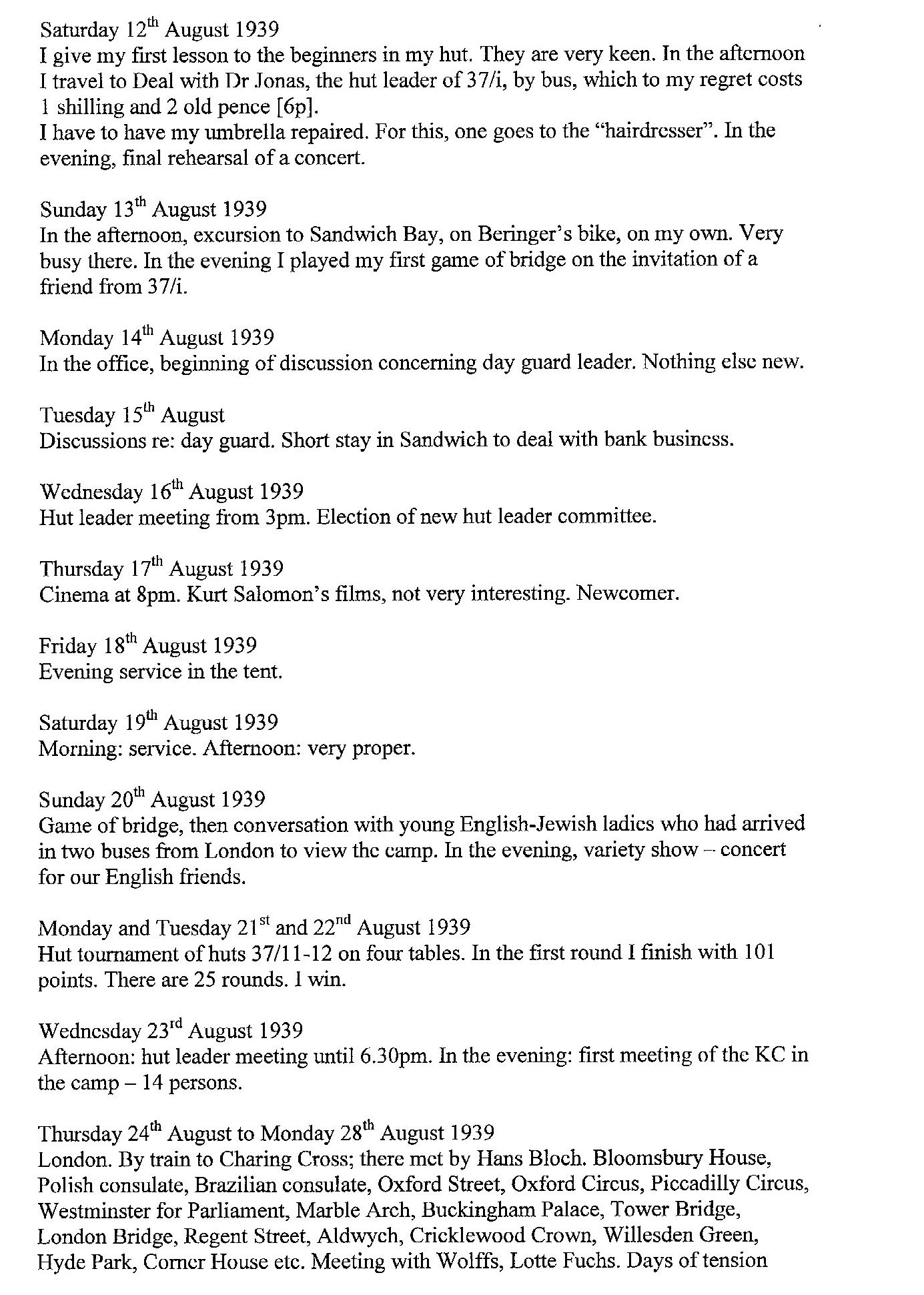
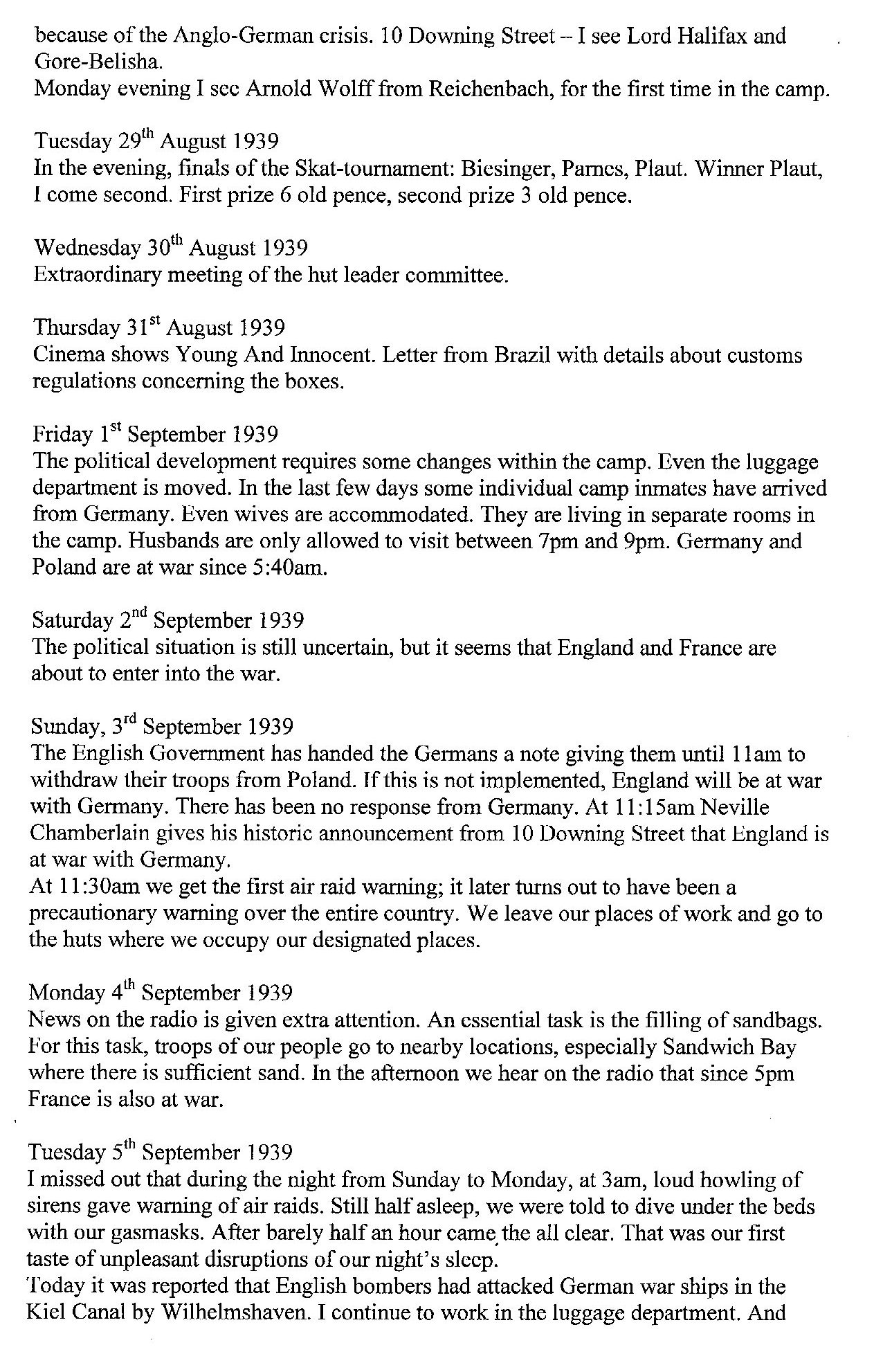
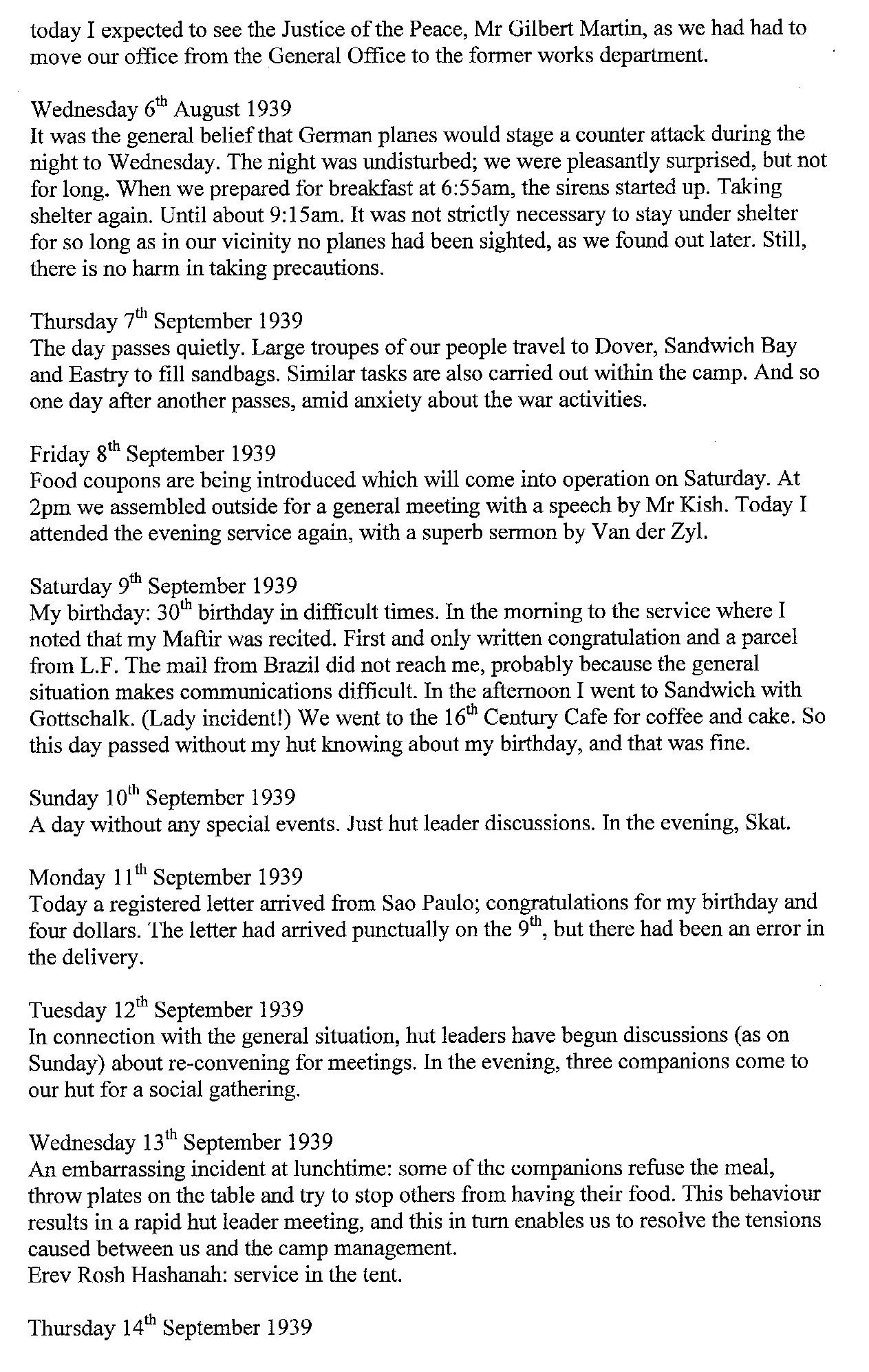
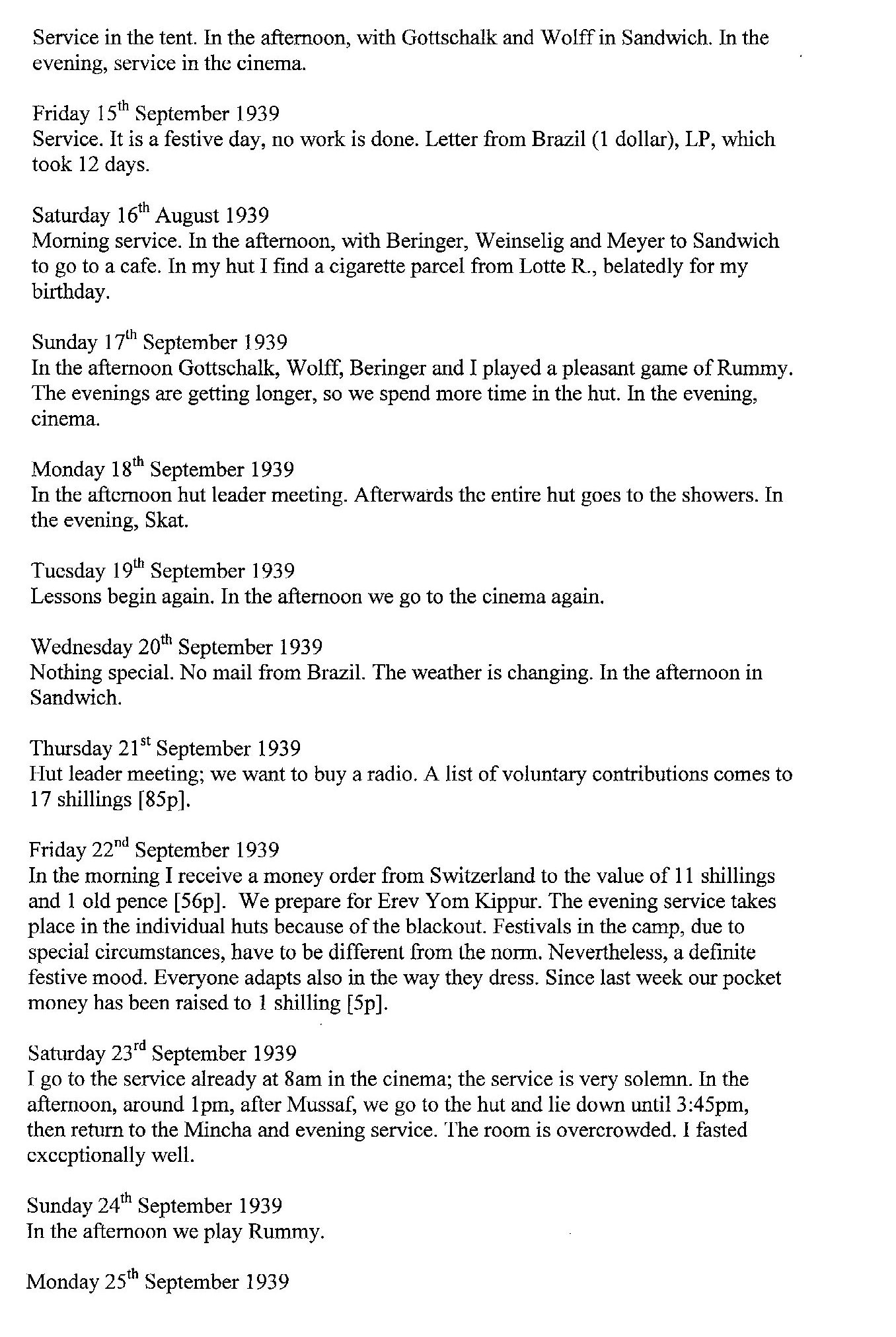
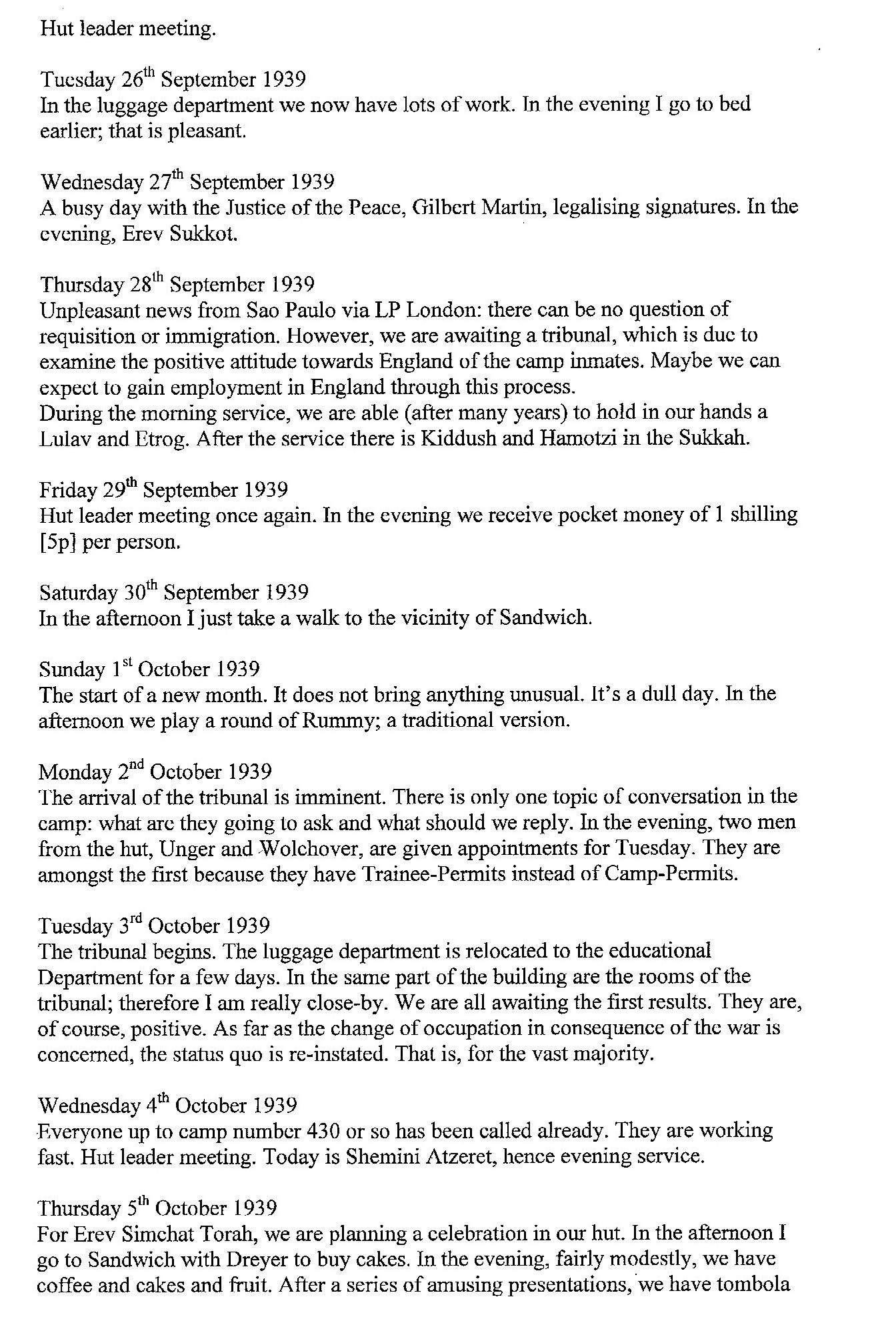
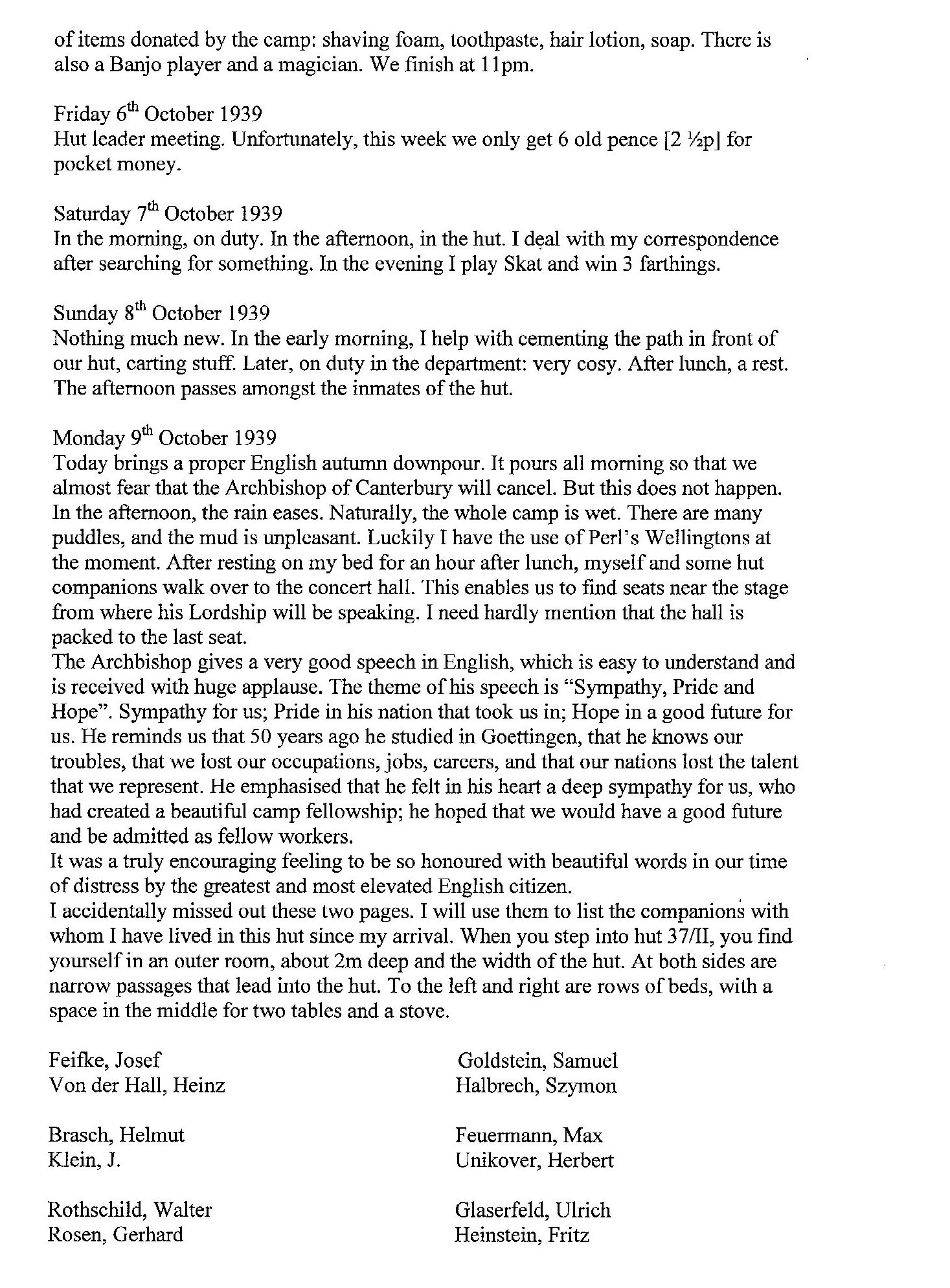
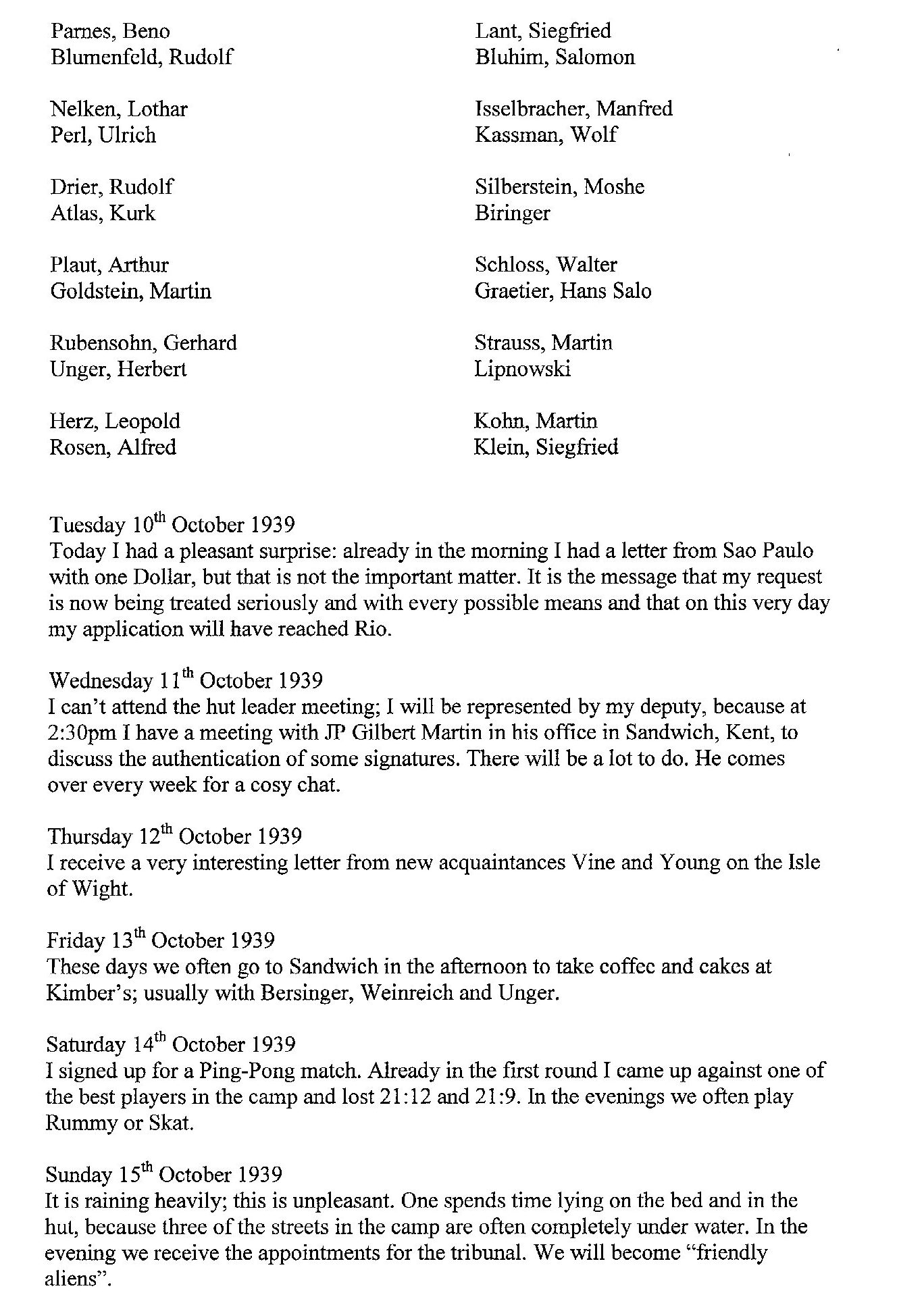
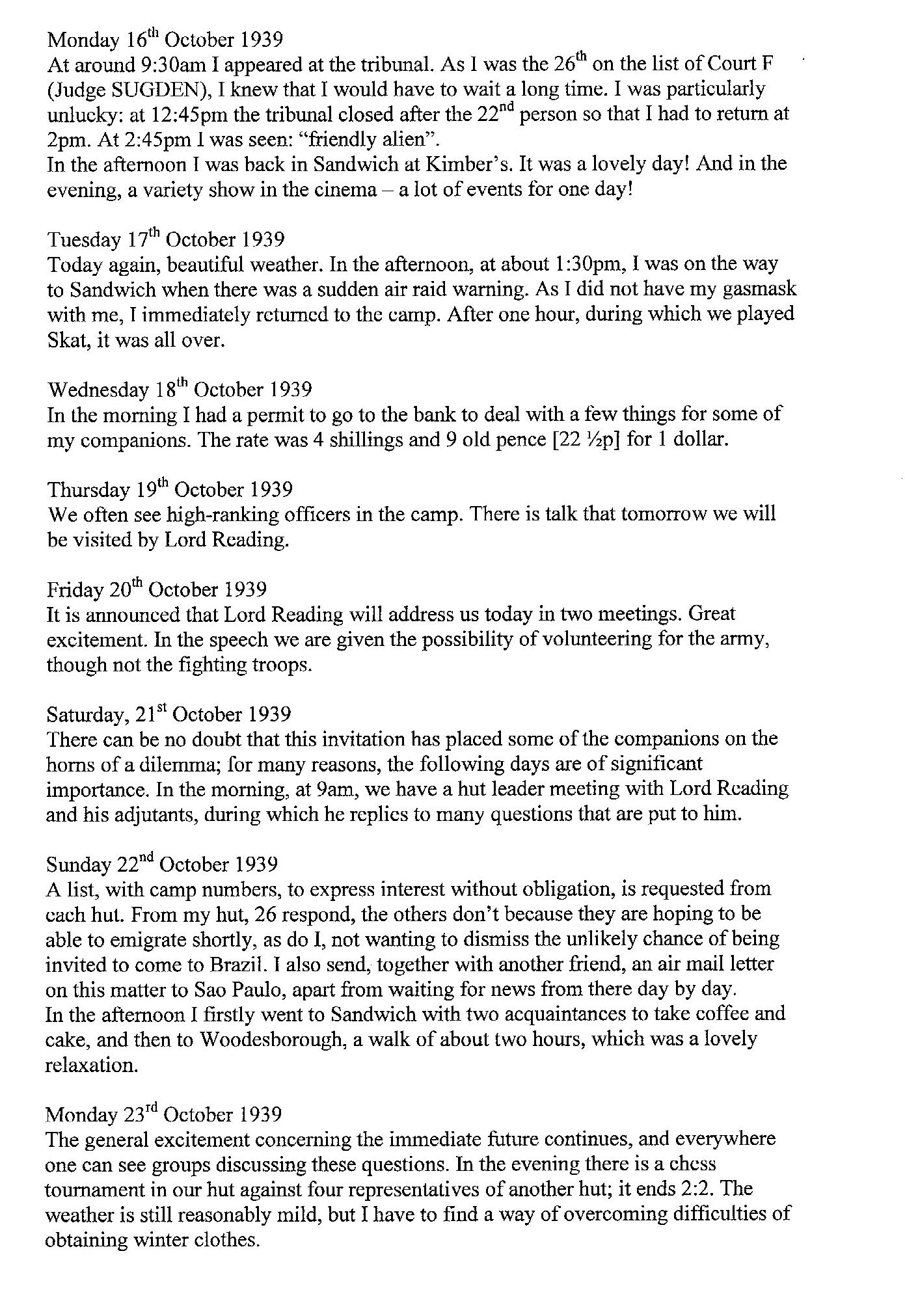
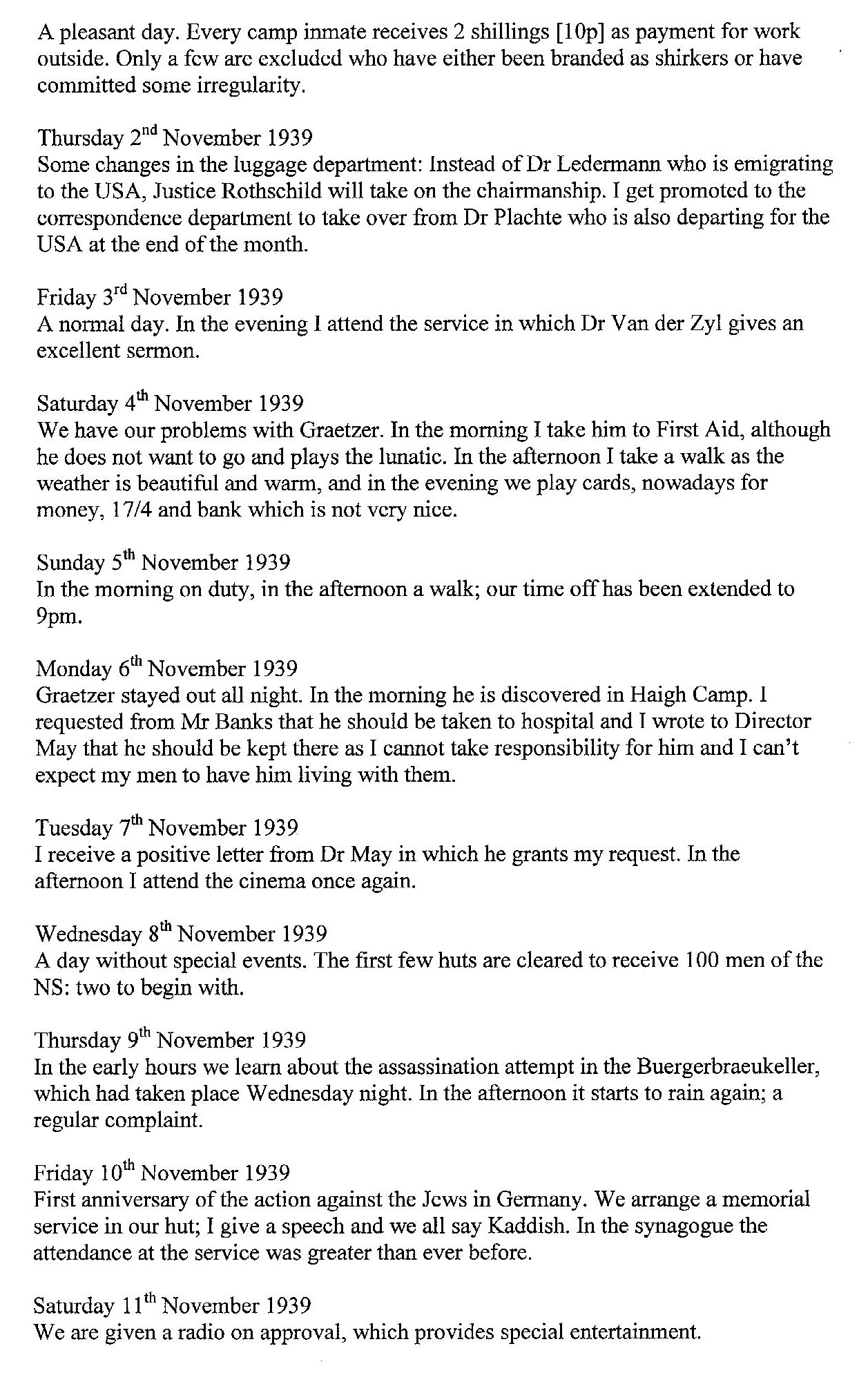
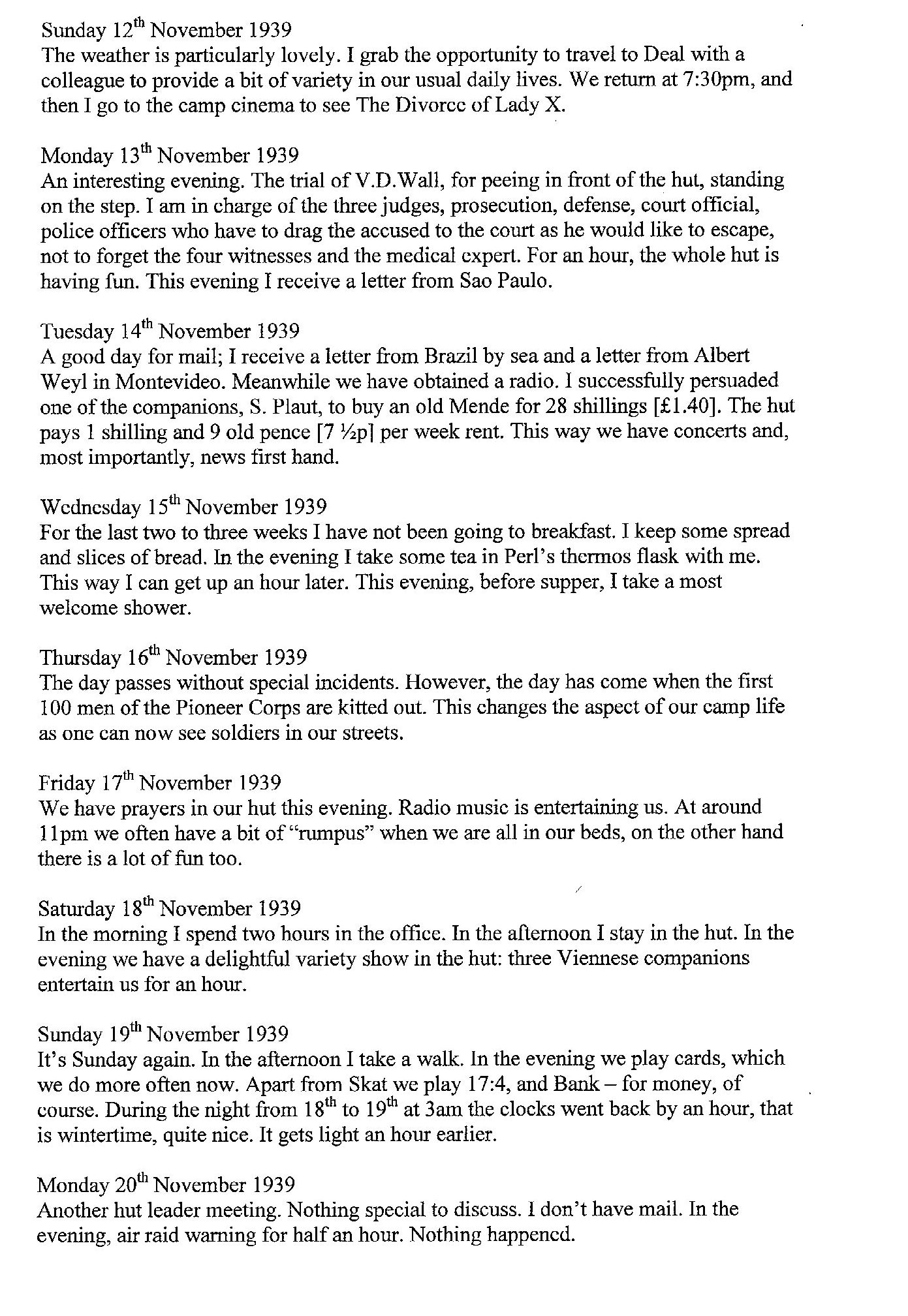
Editor’s note: I have looked up the family names in the above diary notes. Many I cannot be sure about because there is more than one refugee with that name. However, I have managed to locate quite a number of the men who were resident in Lothar’s Hut 37/II.
See this link for the names and more information about these men: https://kitchenercamp.co.uk/information-in-a-diary/
Photographs
Photographs submitted by Stephen Nelken for his father Lothar Nelken

